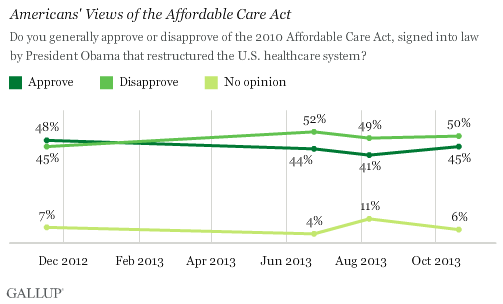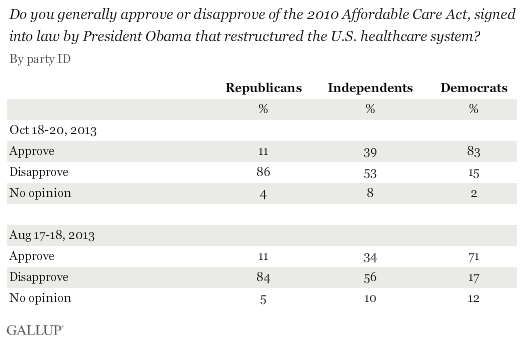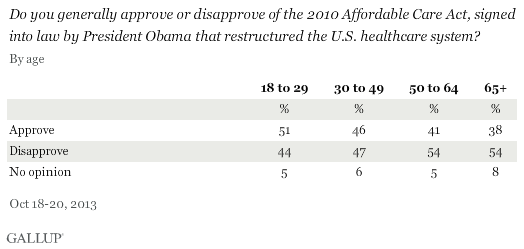PRINCETON, NJ -- Despite the highly publicized technical issues that have plagued the government's health insurance exchange website that went live on Oct. 1, Americans' views of the Affordable Care Act are slightly more positive now than they were in August. Forty-five percent now approve of the law, while 50% disapprove, for a net approval score of -5. In June and August, net approval was slightly lower, at -8.

These results come from a Gallup poll conducted Oct. 18-20, a few days after the end of the recent government shutdown -- which centered on partisan debates over funding the healthcare law -- and as media coverage of the poorly functioning health exchange sites increased. The results suggest that the problems with the health exchanges have not negatively affected Americans' overall views of the law, at least to this point.
While Americans' approval of the healthcare law is slightly higher than earlier this year, other Gallup research shows that the majority of Americans would still like Congress to modify the ACA in some way -- repealing it entirely, scaling it back, or expanding it.
Democrats More Likely Now Than in August to Approve of the ACA
The problems with the rollout of the health exchanges have given Republicans new reasons to criticize the law. However, the percentage of Republicans who disapprove of the law is already so high that it would be difficult for it to rise further. Eighty-six percent now disapprove, little changed from August.
On the other hand, President Barack Obama has taken to the airwaves to defend his signature legislation and to urge Americans to be patient as his administration works out the technical issues on the health exchange website -- and Democrats may be listening. Democrats' approval of the law has risen to 83%, up 12 percentage points since August. In fact, the percentage of Democrats who approve the law nearly matches the percentage of Republicans who disapprove. Independents' approval is up by five points from August, but their views remain significantly more negative than positive.

Younger Americans Are Most Positive Toward the Healthcare Law
Young adults aged 18 to 29 are more likely than middle-aged and older Americans to approve of the healthcare law. They are also the only age group more likely to approve than disapprove. Young adults are more likely to be uninsured than those who are older, and their willingness to get insurance is crucial to the law's success.

Implications
Americans' attitudes about the Affordable Care Act remain more negative than positive, although slightly less so than in August, prior to the government shutdown. Gallup measured these most recent views as the technical problems with the health insurance exchange website garnered increased media attention. This suggests that the poor performance of the health exchange sites may not at this point be negatively affecting Americans' views of the ACA overall. The law remains one of the most polarizing issues Gallup has measured, with more than eight in 10 Democrats approving, while more than eight in 10 Republicans disapprove.
Survey Methods
Results for this Gallup poll are based on telephone interviews conducted Oct. 18-20, 2013, on the Gallup Daily tracking survey, with a random sample of 1,528 adults, aged 18 and older, living in all 50 U.S. states and the District of Columbia.
For results based on the total sample of national adults, one can say with 95% confidence that the margin of sampling error is ±3 percentage points.
Interviews are conducted with respondents on landline telephones and cellular phones, with interviews conducted in Spanish for respondents who are primarily Spanish-speaking. Each sample of national adults includes a minimum quota of 50% cellphone respondents and 50% landline respondents, with additional minimum quotas by region. Landline and cell telephone numbers are selected using random-digit-dial methods. Landline respondents are chosen at random within each household on the basis of which member had the most recent birthday.
Samples are weighted to correct for unequal selection probability, nonresponse, and double coverage of landline and cell users in the two sampling frames. They are also weighted to match the national demographics of gender, age, race, Hispanic ethnicity, education, region, population density, and phone status (cellphone only/landline only/both, and cellphone mostly). Demographic weighting targets are based on the March 2012 Current Population Survey figures for the aged 18 and older U.S. population. Phone status targets are based on the July-December 2011 National Health Interview Survey. Population density targets are based on the 2010 census. All reported margins of sampling error include the computed design effects for weighting.
In addition to sampling error, question wording and practical difficulties in conducting surveys can introduce error or bias into the findings of public opinion polls.
View methodology, full question results, and trend data.
For more details on Gallup's polling methodology, visit www.gallup.com.
